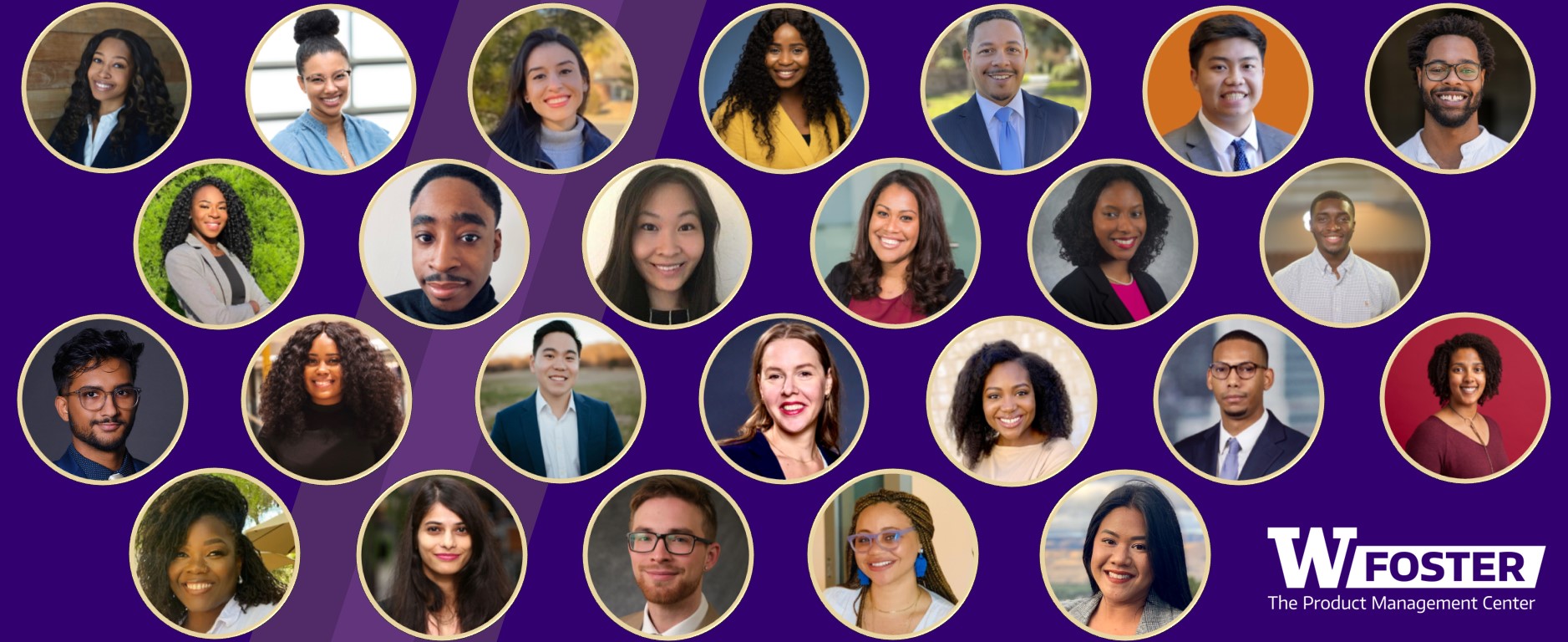Accelerating Inclusion
The Foster School’s Inclusive Product Management Accelerator opens doors to new and diverse talent in a growing line of work
No business can succeed without knowing its audience. Having a diverse workforce is admirable in and of itself, but it is the insights and acumen that a multicultural workforce brings that makes having a broad range of employees so valuable.
The role of product manager varies across industry, but always necessitates communication skills, empathy, creativity, problem-solving talents, passion and perseverance, as well as in-depth industry expertise. Professionals from all backgrounds with these crucial skills exist throughout productive organizations, but not necessarily in roles that are maximizing their potential. This makes product management an ideal option for ambitious mid-career professionals seeking to advance in the workplace.

The Foster Inclusive Product Management Accelerator (IPMA) helps facilitate these career transitions and increase diversity among the product management community.
“Innovations are all too often prioritized by the few for the few, leaving many people feeling unseen, unheard, and uninvited by new technology,” says Jeffrey D. Shulman, director of the Product Management Center and the Marion B. Ingersoll Professor of Marketing at Foster. “Each new product manager from the IPMA is a life transformed, an inspiration to those following in their footsteps, and an advocate for customers who all too often feel unseen, unheard and uninvited by the technology of today.”
Economic and societal benefits
To make this happen, the IPMA recruits candidates for a free online 12-week development program in which fellows are trained in product management strategies and tactics from current product managers at top companies. Funding is provided by partners including Amazon, Salesforce, Starbucks and T-Mobile, who also help with recruitment and job placement.
The accelerator was founded in 2021, and now has over 180 graduates, some of which have landed product manager roles at companies such as ADP, Amazon, Meta, Microsoft and LinkedIn. Each cohort admits approximately 50 students from across the country and spanning industries from education to AI.
Each new product manager from the IPMA is a life transformed, an inspiration to those following in their footsteps, and an advocate for customers who all too often feel unseen, unheard and uninvited by the technology of today.
The curriculum consists of a combination of lectures on various aspects of product management and one-on-one mentoring, which includes resume reviews and mock interviews. The program is designed for those currently working full-time. Students attend two 90-minute sessions per week, with the mentoring and self-study materials available on flexible schedules.
While the program is open to all, IPMA’s core mission is to broaden the number of voices in product management, especially among traditionally underrepresented communities.

Kaitlin Harada Juarez, the associate director of career and employer relations for the program, says that increasing diversity among product managers has economic as well as societal benefits.
“Diversity brings different ideas to the table that traditional voices would not necessarily have brought to light,” she says. “For an organization, it works out really well because they are able to broaden their customer base and create new products that haven’t been done before and can reach a wider audience.”
Career transformations
In 2021, Arin Williams was a photojournalist with KTLA in Los Angeles. He enjoyed his work but was exploring how he could take the next step in his career. Williams found the IPMA via LinkedIn and was immediately intrigued. He had already been thinking beyond his current role and was working on an app that would allow viewers to capture and upload footage for use in television news.

“I had some experience in developing technology and working with engineers,” he says. “I was hearing about the value of product management when talking with our CTO. And here was a program for me to develop my skills as a product manager and see where that could take me.”
Williams says the IPMA exceeded his expectations: “My experience was phenomenal. I had a wonderful mentor who encouraged me to go after what I wanted relentlessly. We did a resume review that was extremely valuable. She was able to help me tailor my resume in a way that made sense for product management.”
Not long after completing the program, Williams cold-contacted a product manager at Comcast, the company at the top of the list that he and his mentor had identified as the best fit for him. He asked for 15 minutes to learn about the manager’s experience, promising a productive chat that would not waste their time. “They took me up on it. One conversation became a series of conversations, which became a friendship,” he says. “And when a position opened up, they told me I should apply for it.”

While at the IPMA, Williams had participated in mock interviews, which increased his readiness and confidence. In March 2022, Williams accepted a role as a product manager working on profiles and personalization at Comcast.
Since then, Williams has returned to the program, this time as mentor. “I want to make my own resources available to the program so that it can continue to be successful,” he says. “I know how hard it is to break into product management, especially as a person of color. Being able to support others who are where I’ve been before really motivates me.”
Teachers, mentors, coaches
Williams is not the only graduate who has returned as a mentor. The same is true for Shaival Kacheria, a senior product manager at ADP. He speaks of the value the program has brought to his own work.

“Being a part of the IPMA has opened my eyes to the importance of intentionally designing products that cater to a diverse range of users,” he says. “It has made me aware of unconscious biases that creep into product development and shown me the importance of putting user needs at the center of everything we do. I now understand that true innovation lies in creating inclusive solutions that solve problems for everyone, not just a select few. I’m thrilled to know that APD is a part of the IPMA and is focusing on adopting inclusion in their product methodologies. This gives me confidence that we are not just building great products, but also creating a positive impact for our users.”
Other program mentors are finding working with the next generation of product managers rewarding as well. Instructors include product management professionals from leading companies such as ADP, Amazon and Nike, who are able to provide real-world examples from their current positions.

“My experience with IPMA was inspiring and thought provoking,” says IPMA mentor Giselle Mota, who serves as chief of product inclusion at ADP. “The work I am focused on is embedding inclusion into process and experiences of Human Capital Management, and seeing minds that are the future of product management already thinking through ways and ideas to make this a reality brings me hope for an inclusive future of work.”
Yasmine Bekheet is a senior technical product manager at Amazon who has led sessions in the IPMA on topics including driving success through inclusive artificial intelligence.

She is on the forefront of utilizing machine learning for enhanced personalization, which improves the customer experience and boosts revenue across Amazon’s channels. It’s a prime example of how product management can drive innovation across an organization.
Bekheet says product management is rarely focused on just a specific product. “In fact,” she says, “most product management roles are in areas that can drive new business and successes.”
While Bekheet is an expert in her field, she views her work with the IPMA Fellows as collaborative: “I wouldn’t say I ‘teach’ product management rather help coach the right areas of focus depending on each mentee’s professional situation.”
Thinking through the why
Shaili Guru (MBA 2018) is a graduate of the Foster Technology Management MBA Program and today is a lead product manager at Nike focused on innovation and machine learning.

At the IPMA she teaches a session titled “Thinking Through the Why” for prospective product managers.
“It’s important to think through why we’re building products, and the impact that could have,” she says. “How is this helping? What similar products already exist, and how is what we are bringing to market different?”
Guru herself is someone who didn’t initially plan on pursuing product management as a career, making her experience all the more relevant. “I have a bachelor’s degree in biology, but I moved to Seattle and started diving into technology,” she says. “I love to help different mentees, especially when they are coming from a non-technical background.”
Of the nearly 250 Inclusive Product Management Accelerator Fellows selected in the first five cohorts, 90% are professionals of color and 70% are women.
